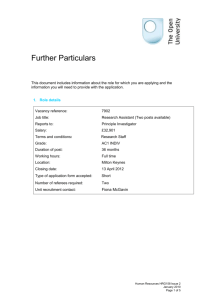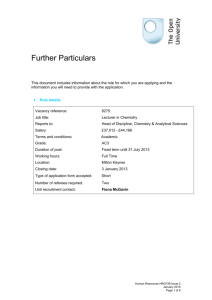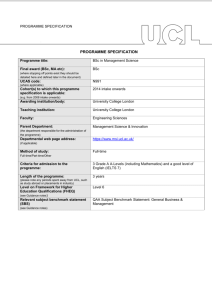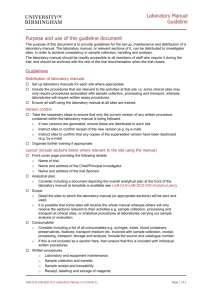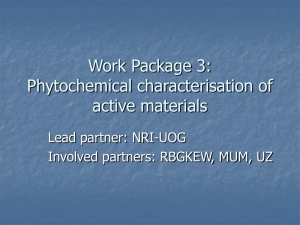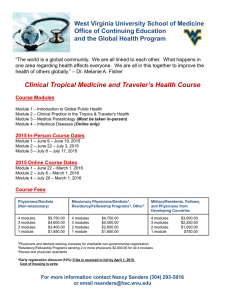Further Particulars HRG158
advertisement
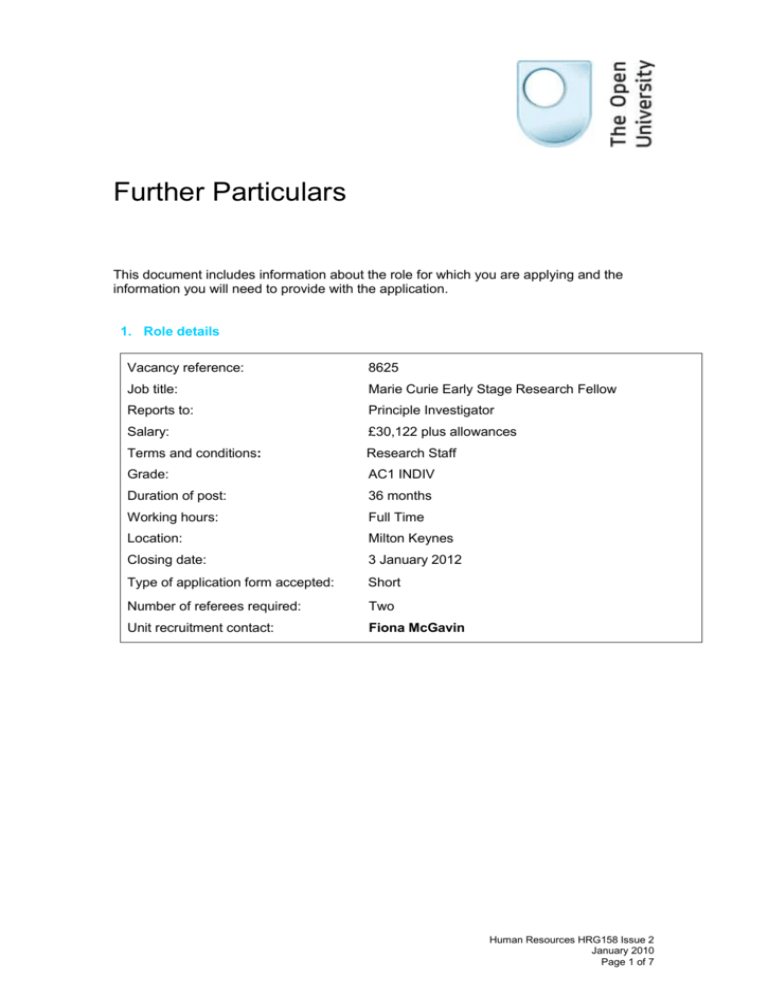
Further Particulars This document includes information about the role for which you are applying and the information you will need to provide with the application. 1. Role details Vacancy reference: 8625 Job title: Marie Curie Early Stage Research Fellow Reports to: Principle Investigator Salary: £30,122 plus allowances Terms and conditions: Research Staff Grade: AC1 INDIV Duration of post: 36 months Working hours: Full Time Location: Milton Keynes Closing date: 3 January 2012 Type of application form accepted: Short Number of referees required: Two Unit recruitment contact: Fiona McGavin Human Resources HRG158 Issue 2 January 2010 Page 1 of 7 2. Summary of duties This appointment offers the opportunity to work in the field of threat agent detection as part of the Marie Curie Initial Training Network (ITN) Proton Ionisation Molecular Mass Spectrometry (PIMMS) funded by the European Commission. PIMMS is a multidisciplinary and intersectoral analytical chemistry ITN with the objective to train 15 Early Stage Researchers (ESR) within a collaborative academic and commercial challenging analytical research network involving 12 full-partners and four associate partners, and with the aim of delivering research through five interlinking themes: Fundamental Research and Development; Food Sciences, Environmental Sciences, Health Sciences, and Homeland Security. The research training is focused on the conduct of internationally leading analytical research projects which, whilst centred upon the development and adoption of Proton Transfer Reaction Mass Spectrometry (PTR-MS) as an analytical tool, will provide training across a wide variety of analytical technologies that are complementary to PTR-MS, thereby providing a broad interdisciplinary and intersectoral experience in analytical chemistry. The main objective of the project at The Open University is to develop PIMMS as an analytical tool and to exploit PTR-MS in health sciences and environmental studies. This role encompasses developing the PTR-MS technique for its use in the analysis of medically important volatile organic compounds (VOCs) by investigating their reactions with hydronium ions in both PTR-MS and SIFT-MS. The project will look at fundamental reactions of hydronium ions and will then use this in medical applications of breath and urine analysis for disease monitoring and diagnosis. The successful candidate will register for a PhD with The Open University and will have the opportunity to undertake training and experiments at other sites within the EU Training Network. All staff are expected: to undertake any other duties which may reasonably be required to take reasonable care of the Health and Safety of themselves and that of any other person who may be affected by your acts or omissions at work. to demonstrate a strong commitment to the principles and practice of equality and diversity 3. Person specification Essential Criteria An excellent Master’s degree in the fields of analytical chemistry, chemical physics, biomedical sciences or a related area. It is required that the degree has been acquired not more than 4 years earlier to the envisaged starting date of this appointment. Good knowledge of English as you will be expected to submit project reports in English. Must have spent less than 12 months living in the UK during the three years prior to the start of this appointment – please see next section for more detail Human Resources HRG158 Issue 2 January 2010 Page 2 of 7 4. Role specific requirements e.g. Shift working The appointment is offered in the context of a Marie Curie Initial Training Network and transnational mobility is a key element of eligibility. Therefore candidates’ eligibility for the post is determined by Marie Curie terms and conditions. Researchers may be either EU citizens or from outside the EU (subject to relevant immigration formalities), but applications will only be accepted from candidates who have spent less than 12 months in the UK within the last three years from the start date of employment. Furthermore, candidates who will have already completed a PhD by the start date of employment are not eligible. The funding for this fellowship covers the monthly salary for three years and other allowances in line with FP7- PEOPLE-2011-ITN. The total fellowship monetary award is approximately €46,000 per annum. In addition, the successful candidate will receive an annual allowance of approximately €11,000 for mobility. Both the annual salary and mobility amounts quoted are the gross amount and will be subject to appropriate tax and national insurance deductions. For more information: http://ec.europa.eu/research/fp7/understanding/mariecurieinbrief/home_en.html. 5. About the unit/department Faculty of Science The Faculty has a staff of about 300, comprising of around 115 academic staff (central and regional/national) with the balance made up of research staff, curriculum managers, laboratory staff, administrators and clerical staff. There are also varying numbers of research students and visiting academic staff. The Faculty has three departments, each with constituent discipline groups: Department of Environment, Earth and Ecosystems Earth Sciences Ecosystems and Biodiversity Department of Life, Health and Chemical Sciences Brain & Behavioural Sciences Cell & Molecular Biology Chemistry & Analytical Sciences Human Biology Department of Physical Sciences Astronomy Physics Planetary & Space Sciences Curriculum The Faculty has developed an extensive range of modules using the Open University's supported open learning teaching model. These modules contribute to a number of qualifications such as the BSc (Hons) Natural Sciences and the more general BSc (Open) degree. In addition, the Faculty supports a number of diplomas and certificates Human Resources HRG158 Issue 2 January 2010 Page 3 of 7 including interdisciplinary offerings with other faculties. Students can choose to study any of our modules and qualifications at their own pace and are supported by tutors, study advisers and on-line conferences. There are optional face to face tutorials for some modules, but many of our modules are accessible entirely online and it is possible to complete the whole Natural Sciences BSc degree in this way. This level of accessibility means that the Faculty supports a large proportion of all the part-time undergraduate degree studies undertaken in the UK. In addition to our degree level programmes, the Faculty offers an innovative range of Science Short Courses that are designed to provide a taster of Level 1 study for those new to undergraduate study. The Faculty also offers a Master's postgraduate degree programme with several taught degrees including the first UK MSc to be accredited by the Council of Graduate Schools as a Professional Science Master's. The launch of a new suite of modules in Practical Science (S288) in February 2012 sees an exciting opportunity for engaging in practical science through online environments and laboratory and field-based activities. The five modules reflect each of the five major disciplines: chemistry and analysis (SXC288); environmental science (SXE288); earth and environment (SXG288); biology and health (SXL288) and physics and astronomy (SXP288). Two promotional videos outlining these new modules are available to view - S288 Practical Science. Research & Enterprise The Faculty of Science undertakes a range of research across many scientific topics, bringing together traditional scientific disciplines and new interdisciplinary areas through two major research groupings: Centre for Earth, Planetary, Space and Astronomical Research (CEPSAR) Astronomy Environmental Change (Past, Present and Future) Natural Hazards Physics Planetary Geosciences Geochemistry and Cosmochemistry Solar System Exploration Biomedical Research Network Biomolecular Damage Biopsychology Cell Biology Disease and Diagnostics Neuroscience Our research encompasses a wide range from 'blue skies' to applied research finding solutions to specific scientific and technological problems. These research activities are supported by world class laboratory facilities and instrumentation and provide opportunities for full time PhD research studentships supported by our own academics and post doctoral research fellows. There are about 48,000 students studying our undergraduate and postgraduate science modules, mainly based in the UK, but increasing numbers are studying online globally. There are also several hundred PhD research students studying full time in our Human Resources HRG158 Issue 2 January 2010 Page 4 of 7 laboratories at our campus in Milton Keynes or part time at partner institutions or affiliated research centres. We have over 4500 square metres of state-of-the-art research laboratories with major research facilities that include: A recently opened facility for interdisciplinary research in ecosystems and geobiology. One of Europe’s leading centres for isotope mass spectrometry including extensive radiogenic, noble gas and stable isotope mass spectrometry facilities and a new £3 million microbeam facility, including a Cameca Nanosims ion imaging system and dual beam FIB-SEM Ultraclean spacecraft instrument testing and assembly, and for handling planetary materials and returned extraterrestrial samples A state-of-the-art life sciences research facility including biological containment laboratories, molecular genetics and DNA-sequencing laboratories Environmental and transmission electron microscopy Hypervelocity Impact laboratory Well equipped laboratories for research in atomic, molecular and plasma research Employers, Science, Technology, Engineering, Entrepreneurship, Mathematics (eSTEeM) eSTEeM is an initiative to bring together academics within Science and the Faculty of Maths, Computing and Technology to develop new approaches to teaching and learning. This centre builds on existing collaborations developed within the Centres for Excellence in Teaching and Learning (CETLs) based at the OU and with other Faculties, aiming to embed new approaches around priority areas such as e-assessment, online experimentation, etc. Further information on the Faculty can be found on our website at http://www8.open.ac.uk/science/main/. Department of Life, Health & Chemical Sciences Head of Department: Dr Hilary MacQueen The Department is made up of 44 academics who undertake teaching, research and scholarship across a wide range of scientific and pedagogic areas. In addition, there are currently 5 post-doctoral researchers and 19 full-time research students. The Department comprises four constituent discipline groups: Brain & Behavioural Sciences, Cell & Molecular Biology, Chemistry & Analytical Sciences and Human Biology. Our Teaching The Department of Life, Health and Chemical Sciences presents a large number of modules that contribute to the BSc Natural Sciences, the BSc Health Sciences, and various Certificates and Diplomas. We also offer all four of the Faculty of Science’s Foundation degrees, and we are at the forefront of employer engagement within the university. We present all the 15-credit Long-Term Conditions modules, and many of the Science Short Modules (10 credits each). We also contribute to several modules at Masters level, in the MSc qualifications in Science, Science and Society, Professional Science, Medicinal Chemistry, Medical Physics and Psychology. At postgraduate level, the Department runs a full PhD research degree programme Human Resources HRG158 Issue 2 January 2010 Page 5 of 7 with students supported by the BBSRC, MRC, charities (such as Research into Ageing and The Migraine Trust) and The Open University. Members of the Department have made many pedagogic innovations, particularly relating to the on-line delivery of practical science and work-based learning, and its assessment. Our Research Members of the Department conduct research within all three of the Faculty’s major research centres, CEPSAR, BRN and eSTEeM. Our research teams comprise biologists, chemists, physicists and psychologists who contribute to a vibrant and interdisciplinary research community. The available laboratory facilities include molecular genetics laboratories, cell and tissue culture suites with time-lapse imaging capabilities, electron, confocal and atomic force microscopes, histology and morphometric laboratories and a radiation suite which houses a cell harvester, beta scintillation and gamma counters. We have an impressive range of GC/LC-MS and liquid chromatography instruments, a range of spectroscopy instruments, and an Xray diffraction facility. We also have a whole-organism facility. Department members offer a range of specialist skills and expertise across the life, health and chemical sciences. We are keen to involve external partners in our research through their involvement in collaborative research projects, sponsored PhD studentships and contract research projects. Much of our research is based on very successful collaborations with other universities and institutes and with industry, both nationally and internationally. Recent research funding in the Department has come from, amongst others, the BBSRC, EU Framework 6&7, World Cancer Research Fund, Wellcome Trust, Leverhulme Trust, Multiple Sclerosis Society, MRC, the Royal Society, NAAR/Autism Speaks, Research into Ageing and NIMH. Our industrial research partners include Regen, Cyclacel Ltd, Human Factors International, Eusa Pharma (Europe) Ltd, Hill Group Aggregate, Entec UK Ltd, Charles Church, Black & Veatch, TAP, Dow-Corning, BP and Hichrom. Our Outreach Members of the Department of Life, Health and Chemical Sciences were in the vanguard of developing health education in sub-Saharan Africa through the HEAT project: http://www8.open.ac.uk/africa/heat/ The Department has strong links in this part of the world and elsewhere, and we are developing a number of opportunities for collaborative teaching and research projects. Closer to home we have many links with schools and communities across the UK. We have also benefited enormously from our long-standing relationship with the BBC, which enables us to disseminate our teaching and research. 6. How to obtain more information about the role or application process If you would like to discuss the particulars of this role before making an application please contact Dr Claire Turner on +44 (0)1908 652881 or email Claire.turner@open.ac.uk. If you have any questions regarding the application process please contact Fiona McGavin on +44 (0)1908 858110 or email science-recruitment@open.ac.uk. Human Resources HRG158 Issue 2 January 2010 Page 6 of 7 7. The application process and where to send completed applications Your application should include: Completed short application form Cover letter CV Please ensure that your application reaches the University by: 3 January 2013 E-mail it to science-recruitment@open.ac.uk or post it to: Name/Job title: Fiona McGavin, Recruitment Co-ordinator Department/Unit: Faculty of Science Address: The Open University Walton Hall Milton Keynes Post Code: MK7 6AA 8. Selection process and date of interview The interview panel will be chaired by Professor Nigel Mason. The other members of the interview panel will include Dr Claire Turner. The interview date will be advised. We will let you know as soon as possible after the closing date whether you have been shortlisted for interview. Further details on the selection process will also be sent to shortlisted candidates. Applications received after the closing date will not be accepted. Human Resources HRG158 Issue 2 January 2010 Page 7 of 7
